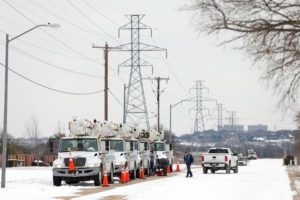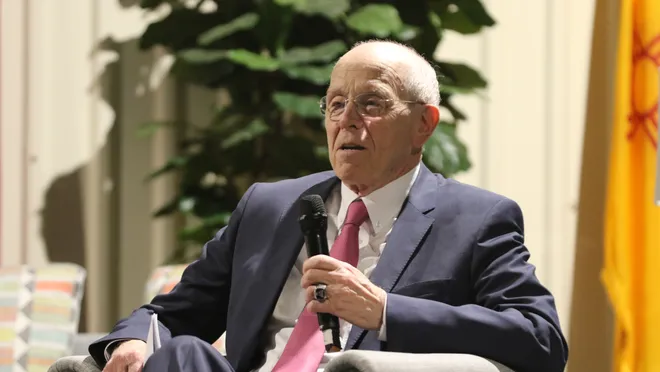 As debilitating power outages stretch on in Texas, I spoke with New York deputy editor David Wallace-Wells about what the dire situation signifies about our extreme-weather future — political point-scoring aside.
As debilitating power outages stretch on in Texas, I spoke with New York deputy editor David Wallace-Wells about what the dire situation signifies about our extreme-weather future — political point-scoring aside.
Ben Hart: As Texas experiences extremely unusual levels of cold and snow this week, the state’s electrical grid is straining. Millions have been without power, and some power companies have ordered rolling blackouts to manage demand. Public officials don’t seem to have a good handle on when the lights will go back on. To your eye, does what’s happening look like more of a Texas-specific problem — the state mostly runs its own unique power grid, unlike other states, whose grids are connected — or more of an inevitable clash between increasingly extreme weather and infrastructure that just isn’t prepared for it?
David Wallace-Wells: It’s both, but I think the more universal lesson is the more concerning one: When it comes to infrastructure, we are really bad at building for resilience and planning for extreme events, even when we know we should. We let systems age rather than update them, we choose paths of least resistance when expanding capacity, and we very rarely take into account climate and weather risk. The Texas grid illustrates all of these problems in particularly Texan ways, but you can point to parallel or analogous problems all across the country — 70 percent of which, by the way, was under snow on Monday (a modern record).
Now, this isn’t narrowly a climate problem — there’s a lot of debate about whether this kind of extreme-cold event is made more frequent by global warming, and the cautious consensus is something like, “We don’t know, but maybe?” But it illustrates very powerfully the stakes for coming climate change, since other kinds of natural disasters and extreme weather will be growing much more common in the decades ahead, and we’ve barely begun to adapt our infrastructure in response.
Ben: A popular right-wing talking point — coming from top officials in the state as well as pundits — is that what’s happening in Texas is somehow an indictment of the fragility of wind power (which the state partially relies upon), and a validation of good old-fashioned reliable coal. This is a major mischaracterization of what’s taking place, correct?
David: In short: yes. There are ways in which renewables can be, broadly speaking, more vulnerable to extreme weather than dirty energy, though advances in battery technology are doing a lot to solve those problems. But in this case the problem is pervasive through the grid, and isn’t at all unique to wind or solar. In fact, the problems with oil and gas supply seem to have played a much larger role.
Ben: The Biden administration has been aggressive — perhaps even surprisingly aggressive — on climate in its early days, with the president signing a blitz of executive orders on the issue and signaling much more action ahead. If he has his way, billions will be directed at firming up infrastructure and preparing for scenarios like the one we’re seeing now. Given that the weather is likely to become more extreme in the coming years, how optimistic are you that this sort of mass-scale government commitment could forestall some of the worst system errors going forward?
David: In theory, of course it’s possible, but it’s a very big lift, since you’re talking about at least retrofitting and in a lot of cases outright replacing a large portion of the country’s infrastructure. I think a lot about the levees built to protect New Orleans after Katrina. They weren’t even designed to withstand a Category 5 storm, and less than a decade after they were finished — at a cost of $14 billion — they may no longer provide even “adequate” protection against storm surges. That’s really bad!
One of the encouraging things about the Biden administration’s approach in general has been how focused they have been in embedding climate considerations into every aspect of government, which would make that kind of fuckup a lot rarer. But it’s not just climate ignorance, or denial, that allowed projects like that to go forward in the first place.
Ben: It’s more just classic tradeoffs between cost and efficiency?
David: Things are expensive, engineering is imperfect, there are all sorts of idiosyncratic local objections, people are bad at planning for extreme events, there are limits to the value of planning windows of any size, our scientific understanding of what counts as climate risk over 30 years or 50 years changes over time …
In general we do have a problematic tendency to conceptualize a recent tragedy as the thing we need to plan around rather than a harbinger of much more intense problems to come. Those New Orleans levees, for instance, would’ve protected against Katrina, which was just a Category 3 at landfall. But looking at the damage you’d think someone in the FEMA meeting would’ve said, “maybe we should go up to Category 5?”
Ben: So in terms of electrical grid failures, what would a much more intense problem look like? The grid going down for weeks or months? Cascading failures that hit states not even affected by the original catastrophe?
David: Both are possible, but the more resilient the grid is, the less likely the second problem would occur. As I understand it, these Texas blackouts are primarily the result of problems with energy supply. But the grid itself is vulnerable, too, and while in a pinch you can draw power from source X if source Y is down, there isn’t a backup grid to use if the first one goes down.
In California, there have now been a number of high-profile episodes where power has been shut down in intense wildfire conditions to prevent the ignition of a new fire — preemptive blackouts from fear of fire. Of course, if those power lines had been designed differently (or buried), you wouldn’t need to worry.
Ben: Though there’s there’s plenty of green energy money flowing in Texas, the state is still dominated by Republicans who have pooh-poohed, if not outright denied, climate change. But despite Governor Greg Abbott and others’ insistence on making this into a culture-war issue, the momentum seems to be going only one away, and that is away from coal. Are disasters like this one just another step toward destigmatizing measures that seemed radical just a few years ago, like GM promising an all-electric fleet by 2035?
David: I think it probably does showcase the brittleness of our power system — really, all of our systems — in ways that are useful to those advocating for a pretty thorough greening. But it’s also scary and disconcerting, and may push some people back to a preference for the status-quo-ante. On the whole, though, yes, I think, Tucker Carlson’s rants aside, things have changed too much already for anything like this to really reverse the momentum.




0 Comments